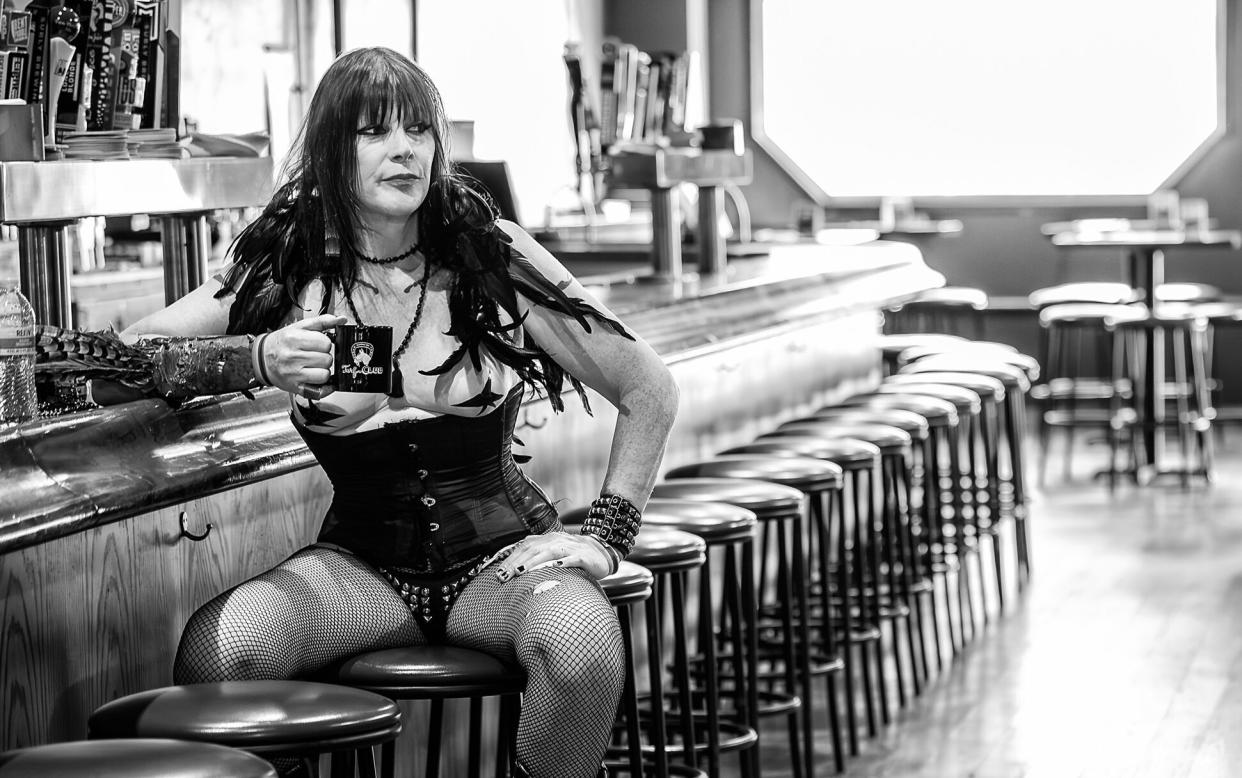Venus de Mars: DIY Punk Hero and Social Activist

As the frontwoman of All the Pretty Horses, Venus de Mars is a paramount figure in the DIY punk scene as one of its first openly transgender artists. Quintessential to De Mars’s narrative is her experience as a transgender woman, a personal evolution paralleling her creative journey. “I lived by circumstance a very non-binary life because insurance didn’t cover anything to do with trans care; it was seen as a mental illness,” she says. Her presence in music challenged stereotypes and forged a path toward advocacy and visibility, resonating with audiences seeking representation.
Beginning in the early 1980s, de Mars has used the stage to share her musical talent and activism. Despite facing a music industry and society that dismissed her as a serious artist due to her gender identity, she relentlessly pursued breaking into the independent world. Amidst her punk rock persona defined by charisma and rebellion, the artist is equally known for her kindness and unwavering commitment to propelling social change.
De Mars’ journey began in Duluth, a small city in Minnesota where she endured the challenges of social isolation as she began to see herself as different. Inspired by David Bowie’s gender-bending allure and punk’s DIY raw energy, de Mars turned to music, and she found solace and a milieu for exploring her individualism. Relocating to Minneapolis with her band, Straight Face, which disbanded in the ‘80s, she stepped onto the art stage to be vocal about her gender identity, a bold move during a time when transgender visibility was often contentious. Founding All the Pretty Horses and the release of their debut album, ATPH, in 1994, marked a watershed point in her career, prompting the artist to embrace her identity more openly, mirrored in her lyrics and stage presence.
“I was trying to be very open about being trans. More people appreciated that and I realized I was creating safe spaces through my shows,” she says. This openness also extended into her music, “My lyrics, though coded, were about being trans and how to survive being trans,” she reveals. Indeed, the band’s song “Floating,” from the debut album, explores the complexities of relationships and the struggle for societal acceptance. Onstage, she deliberately crafted a dominant persona, challenging stereotypes, as she explains, “I developed a dominant look onstage to counter that trope of trans women being submissive.” However, this authenticity encompassed performance venues: “I wanted to make it clear that I wasn’t putting on a costume, that I was trans.”
While based in Minneapolis, in the late 1990s, the band left to explore New York City’s underground punk scene. Initially met with skepticism from audiences, the band gradually earned recognition as an integral part of the city’s music scene. “A friend introduced me to club owners, especially Brooke Webster who ran Meow Mix. Our tour manager, Matthew Hopping, relocated to New York and he was able to get us the gigs,” she says. “The audiences were initially suspicious, not thinking much of anything outside New York. Eventually, because we were performing out there so much, we started to be seen as part of the New York scene.”

Amidst these successes, de Mars also encountered profound challenges, particularly when the music industry was reluctant to welcome transgender artists. The turn of the 21st century highlighted the artist’s resilience and dedication to her cause, as she faced the decision of whether to compromise her individuality for mainstream sensation or honor her identity which she had fought fiercely to live openly.
“I met with a music lawyer in New York in 2001. That’s how you get presented to a major label, which would have given us the investment, money, and guidance to break beyond the indie world. The lawyer was definitive about not being able to sell me as an openly trans individual, suggesting that maybe I’d just be an edgy guy, but not be blatant with my being trans. Of course, I said no.” This decision conserved her musical integrity and positioned her as a vital institution of the underground music scene. “The music industry wasn’t gonna invest in me, but I got known much more broadly and more established in the underground, ” she explains.
At the essence of de Mars’ music and activism abides her unwavering individualism, which has consistently galvanized her to safeguard her work and maintain her distinct voice. “I wanted to preserve it. I’m still working as my own music industry person. I got to do all that work myself, but I feel like I’ve been able to maintain my platform and voice to be able to make a difference,” she explains. Supported by her audience and the LGBTQIA+ community, she embraced her role as a musician and a beacon for the transgender community. “I was encouraged by seeing how people appreciated my presence. That made me want to make music a full-time thing. That was directly related to my being trans and how it enmeshed with my music.”
Despite the persistent societal stigmas and bureaucratic hurdles surrounding transgender identities and healthcare, de Mars eventually found a doctor who facilitated hormone treatment, which was unknowingly covered by her insurance. “The hormones allowed me to do at least a physical transition. I felt so much more comfortable in my own skin. Eventually, in the late 2010s insurance was finally paying for surgery to do transition,” she continues. “That changed everything for me. It lifted a darkness that has been haunting me for my whole life. I do feel like I am where I should have been all along. I feel in the correct body. It feels like I am speaking from a place of resolve.”
Today, de Mars remains unyielding in her advocacy, underscoring the importance of perseverance and community, encouraging future generations to seek out supportive networks and remain steadfast in their identity. “The best way that I can support the community is to stay present and visible, to be out there and share the experiences that I’ve had. There’s not a lot of the older generation present to be able to be there to talk about the world and how we’ve seen it change,” she says passionately. “Those challenges might be very intimidating. Find safe people, find your community, keep those friendships, and don’t give up. Be proud of who you are. Know that you are who you are supposed to be. You’re not wrong. You’re not broken.”
To see our running list of the top 100 greatest rock stars of all time, click here.
